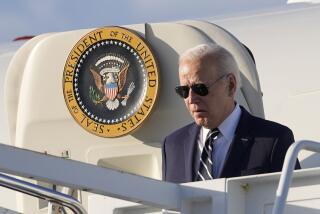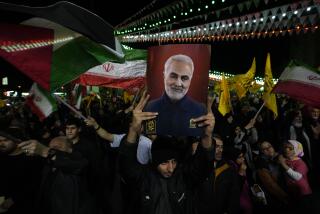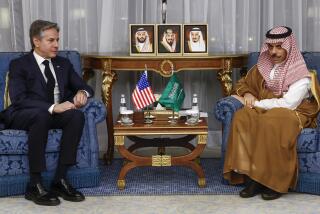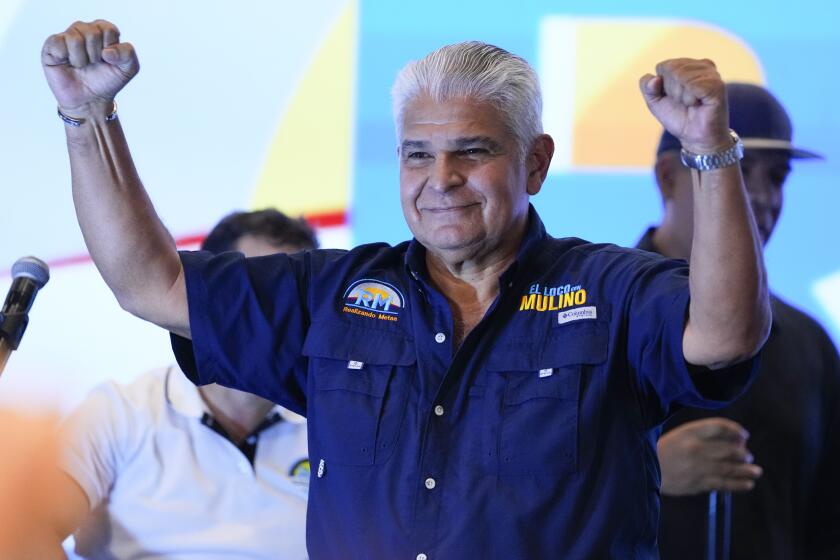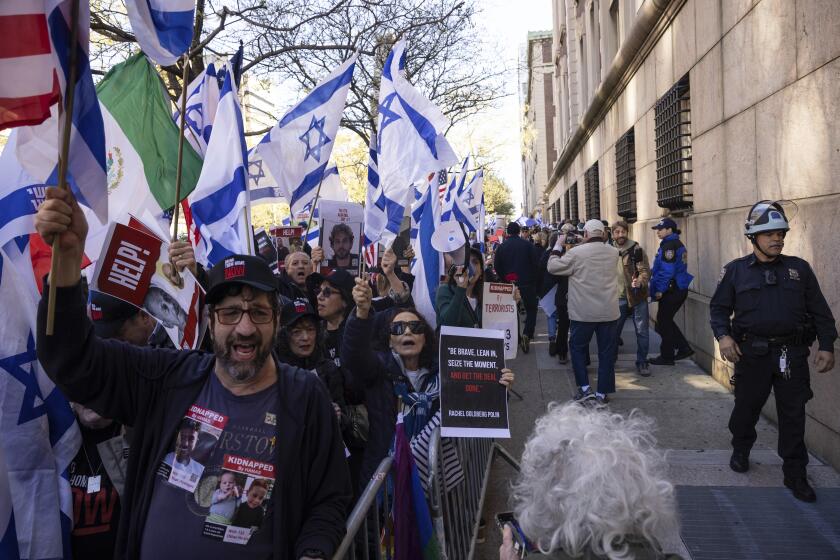Trump team launches an eight-nation Middle East trip to explain, convince, reassure
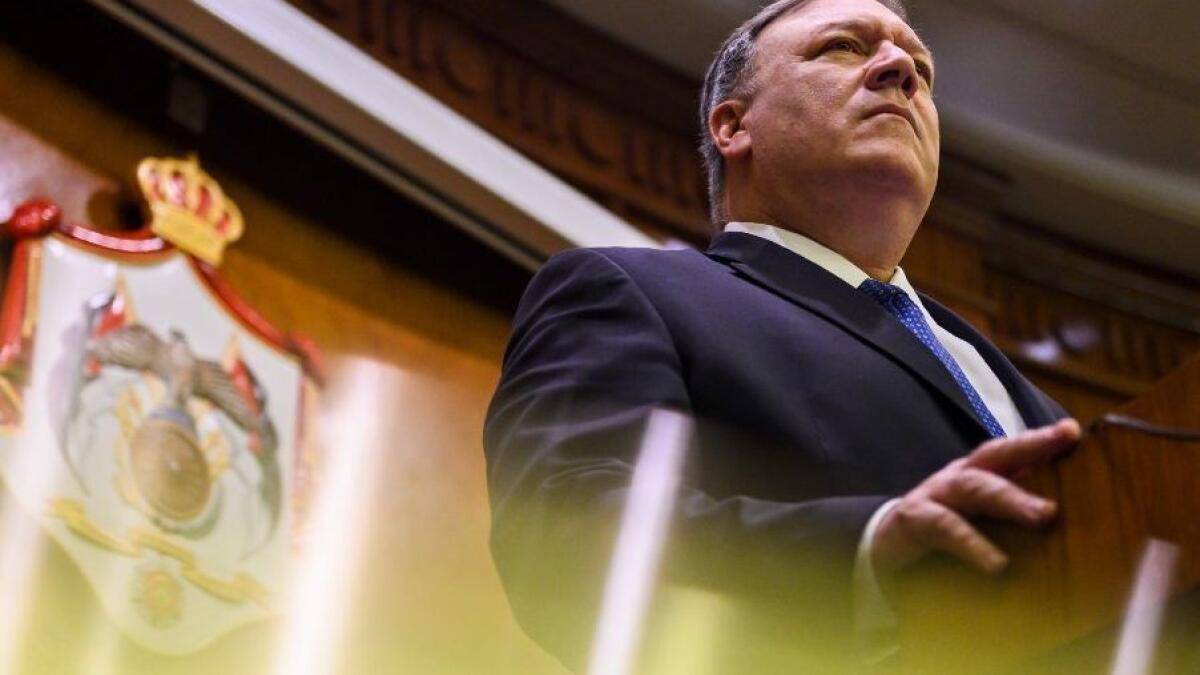
Top Trump administration officials moved through the Middle East Tuesday attempting to explain their boss’ inconsistencies on plans to withdraw from Syria and to convince skeptical allies of Washington’s commitment to them.
On the first day of an eight-nation diplomatic blitz, Secretary of State Michael R. Pompeo insisted his government’s efforts to block Iranian expansion in the region, working alongside key Middle East allies, were as strong as ever, despite President Trump’s recent statement that Iran “can do what they want” in Syria.
“The counter-Iran … coalition [is] as effective today as it was yesterday, and I’m very hopeful that it will continue to be effective and even more effective tomorrow,” Pompeo said at a brief news conference in the Jordanian capital of Amman, ahead of a meeting with King Abdullah.
“The president’s decision to withdraw our folks from Syria,” he said, “in no way impacts our capacity to deliver on that.”
The U.S. withdrawal from Syria, which Trump abruptly announced last month, is expected to give free rein to Iranian militias fighting there in support of President Bashar Assad.
Alarmed at that prospect, and the likelihood that neighboring Turkey would attack U.S.-backed Kurdish fighters in Syria, several administration officials have attempted to roll back Trump’s pledge or obfuscate a timeline.
But in Turkey, national security advisor John Bolton ran into stiff opposition Tuesday from President Recep Tayyip Erdogan.
Erdogan rebuffed Bolton’s suggestion that the withdrawal might take longer than Trump indicated, and refused to agree to any protection of the Kurdish militias, whom he regards as terrorists.
Bolton “made a very serious mistake” in demanding protection, Erdogan said in a caustically worded speech in Ankara on Tuesday, adding that any compromise on the Kurds, who served as the U.S. proxy army in Syria, was out of the question.
Erdogan also said he expected Trump to abide by his original offer to withdraw an estimated 2,000 U.S. troops quickly. Since that first statement, Trump and his advisors have offered varying timetables, or no timetable at all. A spokesman for Bolton stressed the withdrawal would take place at a “proper pace,” again contradicting Trump.
His mission to reassure allies an apparent failure, Bolton departed Turkey without meeting with Erdogan.
Pompeo, who will also travel to Egypt and most of the Persian Gulf nations, sought to dispel the idea that Trump and members of his administration were at odds.
Trump and Bolton “have both said the same thing,” Pompeo told journalists traveling with him shortly after takeoff from Washington late Monday. ”They’ve both said we’re going to get out.”
Independent of Erdogan’s comments Tuesday, the Pentagon continues to hold out hope for reaching an agreement with Turkey to safeguard the Kurds.
The Pentagon has approved a plan submitted by commanders in the Middle East for withdrawing the roughly 2,000 U.S. troops from northeast Syria, Defense officials said Tuesday. A contingent of about 200 troops will likely remain in the far-south Syrian area of Tanf.
Another factor behind a less rapid withdrawal: The U.S. pullout will begin once more progress has been made in defeating the remnants of the Islamic State extremist group, which could take months, a Defense official said.
U.S. commanders have “an approved framework for the withdrawal of forces from Syria, and [are] now engaged in executing that withdrawal,” the Pentagon said in a statement. The framework is “conditions-based,” which could include factors as unpredictable as weather and “will not subject troop withdrawal to an arbitrary timeline,” the statement said.
Though the plan has been approved by senior Pentagon officials, Trump could always switch course to a more rapid withdrawal if progress against Islamic State does not materialize.
In Amman, Pompeo met twice on Tuesday with his Jordanian counterpart, Ayman Safadi, who supported challenging Iran and its regional influence. But he also highlighted other key differences between his country and the Trump administration — including the Israeli-Palestinian conflict.
Safadi reiterated the kingdom’s long-standing belief in the establishment of a Palestinian state with East Jerusalem as its capital, which for decades was also the U.S. position. Trump, however, has refused to embrace either of those concepts, tipping his support for Israel’s demands over Palestinian claims.
Bolton was in Israel during the weekend, before traveling to Turkey, and heard Israeli Prime Minister Benjamin Netanyahu ask for U.S. recognition of Israeli sovereignty over the Golan Heights, a 700-square-mile section of fertile land that Israel captured from Syria in the 1967 Six-Day War and eventually occupied and annexed.
Safadi opposed the Israeli claim. “The Golan Heights is in occupied Syrian territory; international law is clear on that,” he said in the news conference with Pompeo.
On Iran and Syria, Pompeo said the withdrawal would not weaken the administration’s “maximum pressure” campaign against Tehran, which includes economic sanctions.
“You’ll see in the coming days and weeks, we are doubling not only our diplomatic but our commercial efforts to put real pressure on Iran to achieve what it is we set out for them back in May” when Trump withdrew from the landmark Iran nuclear deal that curbed Tehran’s nuclear program, Pompeo said.
Trump’s order to withdraw from Syria was so abrupt that it prompted his well-regarded Defense secretary, James N. Mattis, to resign in protest. Mattis chastised the president’s worldview, disregard for traditional allies and friendliness with adversaries such as Russia.
Brett McGurk, the administration’s top envoy for the anti-Islamic State coalition that was a key actor in Syria, also quit.
On Tuesday, retired Gen. Anthony Zinni added his name to the list of people leaving the administration. Zinni, a four-star Marine Corps general and former head of U.S. Central Command, was placed in charge of attempting to negotiate an end to the dispute between Qatar and many of its Gulf neighbors, including Saudi Arabia, which more than a year ago enacted a blockade on the gas-rich emirate.
Trump initially lent his support to the Saudis and their partners, against Qatar, despite it being home to the largest U.S. military base in the Gulf. That may have made the Saudis less willing to compromise.
Zinni told CBS News that he had found intransigent regional leaders refusing “to agree to a viable mediation effort that we offered to conduct or assist in implementing.”
Staff writer David S. Cloud contributed from Washington.
For more on international affairs, follow @TracyKWilkinson on Twitter
More to Read
Start your day right
Sign up for Essential California for news, features and recommendations from the L.A. Times and beyond in your inbox six days a week.
You may occasionally receive promotional content from the Los Angeles Times.
